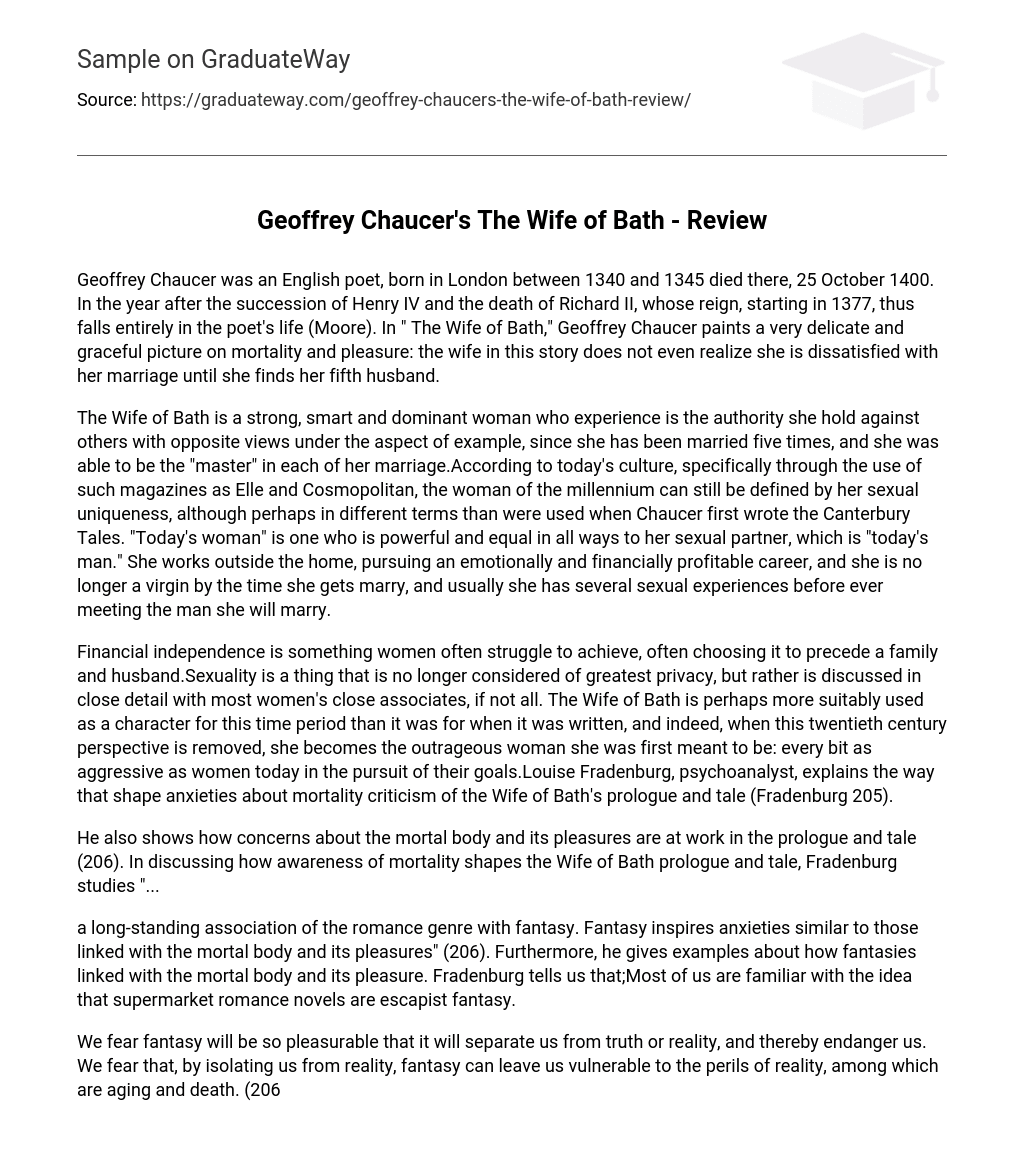Geoffrey Chaucer was an English poet, born in London between 1340 and 1345 died there, 25 October 1400. In the year after the succession of Henry IV and the death of Richard II, whose reign, starting in 1377, thus falls entirely in the poet’s life (Moore). In ” The Wife of Bath,” Geoffrey Chaucer paints a very delicate and graceful picture on mortality and pleasure: the wife in this story does not even realize she is dissatisfied with her marriage until she finds her fifth husband.
The Wife of Bath is a strong, smart and dominant woman who experience is the authority she hold against others with opposite views under the aspect of example, since she has been married five times, and she was able to be the “master” in each of her marriage.According to today’s culture, specifically through the use of such magazines as Elle and Cosmopolitan, the woman of the millennium can still be defined by her sexual uniqueness, although perhaps in different terms than were used when Chaucer first wrote the Canterbury Tales. “Today’s woman” is one who is powerful and equal in all ways to her sexual partner, which is “today’s man.” She works outside the home, pursuing an emotionally and financially profitable career, and she is no longer a virgin by the time she gets marry, and usually she has several sexual experiences before ever meeting the man she will marry.
Financial independence is something women often struggle to achieve, often choosing it to precede a family and husband.Sexuality is a thing that is no longer considered of greatest privacy, but rather is discussed in close detail with most women’s close associates, if not all. The Wife of Bath is perhaps more suitably used as a character for this time period than it was for when it was written, and indeed, when this twentieth century perspective is removed, she becomes the outrageous woman she was first meant to be: every bit as aggressive as women today in the pursuit of their goals.Louise Fradenburg, psychoanalyst, explains the way that shape anxieties about mortality criticism of the Wife of Bath’s prologue and tale (Fradenburg 205).
He also shows how concerns about the mortal body and its pleasures are at work in the prologue and tale (206). In discussing how awareness of mortality shapes the Wife of Bath prologue and tale, Fradenburg studies “…
a long-standing association of the romance genre with fantasy. Fantasy inspires anxieties similar to those linked with the mortal body and its pleasures” (206). Furthermore, he gives examples about how fantasies linked with the mortal body and its pleasure. Fradenburg tells us that;Most of us are familiar with the idea that supermarket romance novels are escapist fantasy.
We fear fantasy will be so pleasurable that it will separate us from truth or reality, and thereby endanger us. We fear that, by isolating us from reality, fantasy can leave us vulnerable to the perils of reality, among which are aging and death. (206)Fradenburg’s studies show that pleasures can make people nervous, because people fear that fantasies may cause over pleasure, which is a preferable option to the real world. In Wife of Bath Chaucer suggests, “fantasies can have the power to remake the social realities in which we live and desire” (qtd.
in Fradenburg). Says Fradenburg in his psychoanalytic criticism. Fradenburg’s studies show that sometimes fantasies are only options to the real world, and that is why people fear from fantasies.In Wife of Bath Chaucer takes attention about pleasure of the wife.
He says:Thanne wolde I seye, “Goode lief, taak keep, / How mekely looketh Wilkyn oure sheep! / Com neer, my spouse, lat me ba thy cheke! / Ye sholde been al pacient and meke, / And han a sweete spiced conscience, / Sith ye so preche of Jobes pacience. / Suffreth alwey, syn ye so wel kan preche, / And but ye do, certein we shal yow teche / That it is fair to have a wyf in pees . . .
(Chaucer, lines 437-45).In this passage Chaucer says that:Then would I say: “Good dearie, see you keep In mind how meek is Wilkin, our old sheep; Come near, my spouse, come let me kiss your cheek! You should be always patient, aye, and meek, And have a sweetly scrupulous tenderness, Since you so preach of old Job’s patience, yes. Suffer always, since you so well can preach; And, save you do, be sure that we will teach That it is well to leave a wife in peace . .
. (Librarius).The Wife of Bath continually emphasizes about women and pleasure. It is a reality, Wife of Bath, which pleasure, fantasy and women are not opposed to honor or truth.
The wife of Bath is a very jealous woman, who desires only a few simple things in her life. She likes to make parallel images of herself, through her stories, which in some way reflects the person who she really is.The aspects in the Wife of Bath’s prologue are mostly on sexual pleasure and fantasy. Her explanation shows the effort for power causes conflict, occasional violence, and abuse.
It is significantly easy to understand the Wife of Bath’s view in medieval society because in her time women did not have the same rights as men have. She expresses her strong opinions, which results in gaining the power that she always wanted. The Wife of Bath’s tale is one of struggle of power and who has the upper hand in any relationship. The wife clearly in her relationships enjoyed having the power and control of her husbands.
Although she has been married five times, she is able to be the “master” in each of her marriage.





